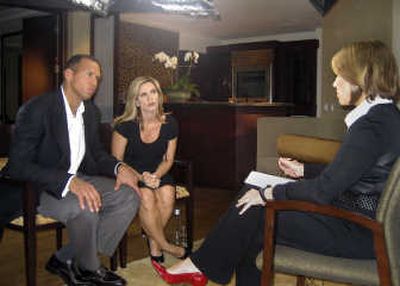Steroids don’t tempt Rodriguez

In an interview with Katie Couric on “60 Minutes” that aired Sunday night, Alex Rodriguez talked freely on many subjects, including steroids, his opt-out with the Yankees and his damaged relationship with agent Scott Boras.
Rodriguez said flatly he has never used steroids or performance-enhancing drugs or been tempted to do so. When asked if he ever felt like he should try them to keep up with someone else’s numbers, Rodriguez said:
“I’ve never felt overmatched on the baseball field. I’ve always been in a very strong, dominant position … I didn’t have a problem competing at any level. So, no.”
In the wake of the Mitchell Report, the three-time American League Most Valuable Player said it could be “a huge black eye” for baseball. Yet he said he still believes Barry Bonds has the home run record, disputing Couric’s assertion that Bonds has an asterisk next to his name. Rodriguez said, “He’s innocent `til proven guilty.”
Rodriguez’s 10-year, $275-million contract to return to the Yankees was officially announced Thursday, after being agreed upon last month. But that followed a tumultuous period after Rodriguez opted out of the final three years of his contract during the final game of the World Series. The timing, Rodriguez reiterated, came as a shock to him.
Rodriguez called the timing, which happened because of his agent: “unacceptable and inappropriate. And, you know, when you do things the wrong way, that’s what you get.”
He and Boras are not speaking.
No easy solution seen
Even if baseball and the players union agreed to every recommendation in the Mitchell Report, stemming the use of performance-enhancing drugs will be a long-term project with no easy solutions.
Experts devoted to eliminating drugs in sports say it’s a three-part problem, one that involves finding an effective test for human growth hormone, staying ahead of those creating new illegal drugs and, most important, changing the drug culture in baseball.
Don Catlin, one of the world’s foremost scientists in the fight against doping, said he has made some headway with the $500,000 Major League Baseball gave him to begin work on finding an effective urine test to detect human growth hormone.
HGH was identified in the Mitchell Report as one of the biggest problems, in large part because it’s nearly undetectable. Only blood tests currently can detect signs of HGH use, and they aren’t considered advanced enough to catch cheaters who use any measure of sophistication.
A urine test is thought by some to be years away, though Catlin is trying, and has had enough success that he is considering asking for more money to move the studies forward.
A number of experts were most encouraged by the report’s recommendation that baseball find ways to investigate and punish drug users who don’t test positive, but are linked to receipt and use of drugs nonetheless.
Going after these so-called “non-analytical” cases is an increasingly important step in the U.S. Anti-Doping Agency’s effort to keep drugs out of Olympic sports. Track star Marion Jones lost her five medals from the 2000 Sydney Olympics as the result of legal issues and evidence that did not include a positive doping test.
Donnelly denies using
Free agent reliever Brendan Donnelly, who pitched for the Boston Red Sox last season, denied claims in baseball’s Mitchell Report that he used performance-enhancing drugs.
In the report, former Mets clubhouse attendant Kirk Radomski recalled that Donnelly called him in 2004 looking for Anavar, an anabolic steroid. The report said Radomski made one sale to Donnelly of Deca-Durabolin for which Donnelly paid $250 to $300.
In a statement published by ESPN.com and the Boston Herald, Donnelly admits calling Radomski to discuss Anavar in 2004, when the pitcher was injured.
“Upon learning that Anavar was classified as a steroid, I realized that was not an option,” Donnelly said. “That was the end of it. Yes, I called him. But I did not purchase or receive anything from him. I never took Deca or Anavar. I do want to fully support the testing program of Major League Baseball, and I support wider testing.”